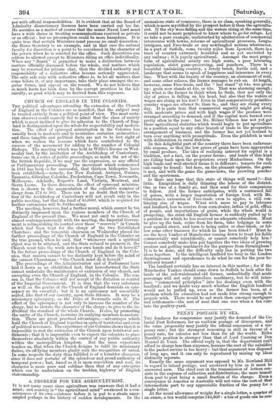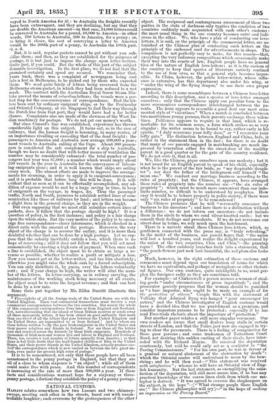PENNY POSTAGE BY SEA.
THE fondness for compromise may justify the demand of the Co- -Ionial Post Reformers for an uniform postage of threepence, and the same propensity may justify the official concession of a six- penny rate ; but the strongest reasoning is still in favour of a penny rate, for colonies not less than for all the world. Flihu Burritt's position is stronger than that of Lord Canning or Don Manuel de Ysasi. The official reply is, that the department can't afford to charge less than sixpence, because the cost of the subsidies to the packet service is too heavy : but that argument was disposed of long ago, and it can only be reproduced by mixing up ideas distinctly separate. Exactly the same argument was opposed to Mr. Rowland Hill in regard to inland postage, and answered by him as it must be answered now. The chief cost in the transmission of letters con- sists in the expense of collection and distribution; the mere transit from post to post being a small fraction of the charge. Eves a. conveyance to America or Australia will not raise the cost of that intermediate part to any appreciable fraction of the penny for a single letter.
At the usual allowance of weight for a single letter, a quarter of an. ounce, a ton would. comprise 143,360: a ton of goods can be con-
veyed to North America for 3/. : to Australia the freights recently have been extravagant, and they are declining, but say that they
are double the American amount—in that case, 24,000 letters could be conveyed to Australia for a pound, 48,000 to America—in other words, 100 letters to Australia, 200 to America, for a penny; or, to bring it closer, the cost of conveying a letter to America would be the 200th part of a penny, to Australia the 100th part. Q. e. d.
But, it is said, regular packets cannot be got without you sub- sidize them ; and then, as they are established for the purposes of postage, it is but just to impose the charge upon letter-writers. Quite just, if you could. But the whole of this part of the subject demands investigation. In the first place, we do not find that the promised certainty and speed are secured. We remember that, years buck, there was a complaint of newspapers being cast into a hut in Melbourne, to be picked out by those who expected them. We read quite lately of letters being recovered from the Melbourne steam-packet, in which they had been reduced to a wet
mash. The contract with the Australian Royal Screw Steam Mis- take proved the means of retarding letters; the vessels were a per-
fect trap for the non-conveyance of correspondence. Had the let- ters been sent by ordinary emigrant ships, or by the Peninsular and Oriental Company, or viO. Singapore to find their way through the Dutch line from that port, they would have had a far better chance. Complaints also are made of the slowness of the West In- than machinery for postage. We do not get our money's worth.
But since Cunard's line was established, experience has thrown considerable light on this subject. It turns out, as in the case of railways, that the human freight is becoming, in many routes' of an importance rivalling or exceeding that of the dead freight : the passengers to America and Australia now average 300,000 a year; most vessels to Australia calling at the Cape. About 300 passen- gers is considered the safe complement for a ship to Australia, though we have no doubt that with better means of ventilation the number may be considerably enhanced : the total number of pas- sengers last year was 87,000; a number which would imply about 250 vessels in the year to Australia for the conveyance of labour- ing emigrants alone ; and it is well known that ships are sailing every week. The utmost efforts are made to improve the arrange- ments for steaming, in order to apply it to emigrant-conveyance; and it is probable that before long this will be done. It is self- evident that as soon as it can be effectually accomplished, any ad- dition of expense would be met by a large saving in time, in keep of emigrants on. the voyage, in wages, &e. Thus the passenger traffic, North and South, promises to establish settled lines of com- munication like those of railways by land ; and letters can become a slight item in the general charge, as they are in the weight. But even supposing that we must still subsidize certain lines of packets, does it follow that the postage should be high ? It is a question of policy, in the first instance; and policy is a fair charge upon the whole state. But the very motive of the policy is to encou- rage free correspondence—closer intercourse, which is checked in a direct ratio with the amount of the postage. Moreover, the very object of the charge is to recover the outlay, and it is more than doubtful whether that can be done by a high postage. Let us sup- pose that the subsidy inevitably entails a loss, which there is no hope of recovering ; still it does not follow that you will act most economically by exacting a high rate of payment. When once such a line is established, the object must be to obtain as large a re- venue as possible, whether to realize a profit or mitigate a loss. Now you cannot get at the letter-writer, and tax him absolutely ; otherwise you might raise the whole sum by a forced subscription. You can only distribute it, by guess over the letters voluntarily sent ; and if your charge be high, die writer will stint the num- ber of the letters. In letter-carrying, as in railway carrying, the maintenance of the working stock being necessary at all events, the object must be to raise the largest revenue ; and that can best be done by a low rate.
Some facts put together by Mr. Elihu Burritt illustrate this argument.
"Five-eighths of all the foreign trade of the United States are with the United Kingdom. These vast commercial transactions must involve a vast commercial correspondence between the two countries. But nearly the whole of this commercial correspondence flows into or from England and Scotland. Yet, notwithstanding that the island of Great Britain receives or sends away all these mercantile letters, it has been stated on good authority that more than one-third of all the letters that pass between the United Kingdom and the United States are transmitted to or from Ireland ! And by whom are these letters written ?—By the poor Irish emigrants in the United States and their poorer relatives and friends in Ireland. Nor are these all the letters sent and received across the Atlantic by these Irish emigrants. Hundreds of thousands of Irish men and women live and labour in England and Scotland. These, too, receive a vast number of letters annually from America ; so that there is but little doubt that the hard-handed children of Erin in the United States, and their poorer friends in the United Kingdom, actually produce one- half the correspondence which is now carried on between the two great na- tions, even under the present high rates of postage."
It is to be remembered, not only that these people have all been accustomed to the penny postage in England, but that they are all of a class to whom sixpence is "an object"; while all of them could make free with pence. And this number of correspondents is increasing at the rate of more than 300,000 a year. If these facts and considerations warrant hope for a sixpenny or three- penny postage, a fortiori they establish the policy of a penny postage.



























 Previous page
Previous page